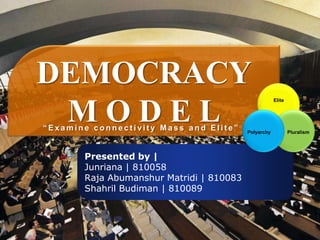
Elit, pluralism and polyarchy
- 1. Company LOGO DEMOCRACY Elite MODEL “Examine connectivity Mass and Elite” Polyarchy Pluralism Presented by | Junriana | 810058 Raja Abumanshur Matridi | 810083 Shahril Budiman | 810089
- 2. DEMOCRACY DEFINITION MODEL Democracy as "government According Michel (1915), Mosca of the people, by the (1939), and Mills (1956) and Pareto (1976), on Tansey and Jackson book people, for the people“ and individual participation in the (2008) focus on “who rules” decisions that affect one’s (stess on alleged universal traits of life. of human nature). (Abraham Lincoln, Thomas R. Dye and Harmon Zeigler, 2000) Elites are the few who have Democracy is a system of power, the “masses are the government where the many who do not”. (Thomas R. Dye and Harmon Zeigler, 2000) government liable for their actions in the public region The elite model of politics hold by citizens, acting indirectly through the competition and that society is governed by a co-operation with the group of political elites who have representatives of those who a disproportionate amount of have been elected. (Philippe C. political power. (Jeffrey D. Schmitter and Terry Lynn Karl, 1991) Greene, 2005)
- 3. The Iron Law of Oligarchy Robert Michels Social and political organization that is run by a few individuals, and the social organization and division of labor is the key. Two power side of Oligarchy: 1. Arranged in order of power focuses on the control of a very small elite group 2. As an elite arrangements in small number capable to determine public policy
- 4. The Basic Principles of the Elitist Model of Politics American society is divided into those who have political power (the few) and those who do not have political power (the many). Those who govern are not typical of the masses. Elites come from the upper echelons and upper socioeconomic strata of society. Nonelites must slowly be elevated into higher positions to avoid revolution or social and political instability. Elites share a basic consensus about the basic values of the social system and are committed to protecting and preserving the system (the status quo). Public policy does not reflect demands made by the masses. Elites are subject to little direct influence from the apathetic masses. Public policy is directed from the top downward.
- 5. P LU R A L I S M M O D EL System in which all interest organize and compete freely and no one group is able to dominate. (Shiveley, 2012) Patterns of Organized Interest-Group Activity High Scale of Organization Ideal Way } How To Reach political Common Low on Direct Involvement of Ground of decision interest group in government Society are made (Shiveley, p.293-294) (Tansey. Jackson, 2008)
- 6. P LU R A L I S M M O D E L II The key concept of the pluralist model (Held:1987): “Diversity; Interest groups; and Social movements” The Basic Principles of the Pluralist Model (Greene:2005): 1. Power is an attribute of individuals in their relationships with other individual in the process of decision-making. 2. Power relationships are not permanent. 3. There is not a permanent distinction between the elites and masses. 4. Leadership is fluid and mobile (flowing and moving). 5. There are multiple centers and bases of power in society. No single group dominates decision making in all areas. 6. Considerable competition exists between interest groups. 7. Public policy reflects the bargains and compromises reached between competing groups.
- 7. P OLYARCHY MODEL Polyarchy refers to modern representative democracies that have universal suffrage. Competitive Political System Focusing on two dimensions essential to these Equal participation into regimes, participation and political institution contestation. Specifies a limited number of institutions that together are necessary and sufficient for its existence.
- 8. P OLYARCHY M O D E L II People have the right to vote. People are eligible for public office. Political leaders have the right to compete for votes. 8 Components, or institutional requirements of Polyarchy (Robert A. Dahl, 1971) Elections are free and fair. All citizens are free to form and join political parties and other organizations. All citizens are free to express themselves on all political issues. Diverse sources of information about politics exist and are protected by law. Government policies depend on votes and other expressions of preference.
- 9. Where’s ASEAN Position? DEMOCRACY INDEX 2011 Countries Rank Rank I II III IV V Overall Electoral process Functioning Political Political Civil score and pluralism of government participation culture liberties Thailand 58 6.55 7.83 6.07 5.56 6.25 7.06 Indonesia 60 6.53 6.92 7.50 5.56 5.63 7.06 Malaysia 71 6.19 6.50 6.79 5.56 6.25 5.88 Philippines 75 6.12 8.33 5.00 5.00 3.13 9.12 Singapore 81 5.89 4.33 7.50 2.78 7.50 7.35 Cambodia 101 4.87 6.08 6.07 2.78 5.00 4.41 Vietnam 143 2.96 0.00 4.29 2.78 6.25 1.47 Laos 156 2.10 0.00 3.21 1.11 5.00 1.18 Myanmar 161 1.77 0.00 1.79 0.56 5.63 0.88 Brunei - - - - - - - Darussalam Source: Economist Intelligence Unit (2011)
- 10. THANKS FOR YOUR ATTENTION
Hinweis der Redaktion
- Shively, W. P. (2012). Power and choice: an introduction to political science(10nd ed.). New York: McGraw-Hill.Tansey, S. D., & Jackson, N. A. (2008).Politics the basics (4th ed.). New York, NY: Routledge.
- References:Greene, J. D. (2005). Public Administration in the New Century: A Concise Introduction. Belmont, CA: WadsworthHeld, D. (1987). Models of democracy. Cambridge: Polity Press
- Reference: Polyarchy, Participation and Opposition by Robert A. DahlJournal of Peace Research, Vol. 10, No. 4 (1973), p. 401
- Freedom of “electoral party”A competitive, multiparty political systemUniversal adult suffrageRegularly contested elections conducted on the basis of secret ballots, reasonable ballot security and the absence of massive voter fraudSignificant public access of major political parties to the electorate through the media and through generally open political campaigning
